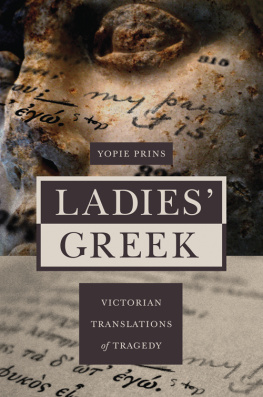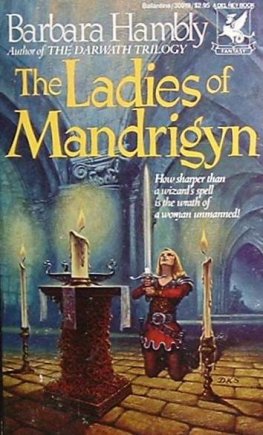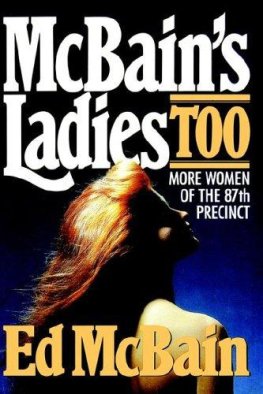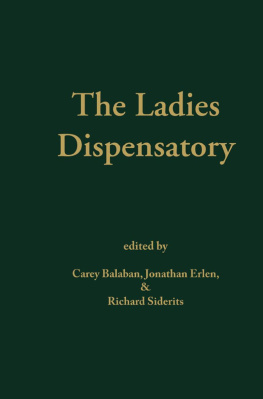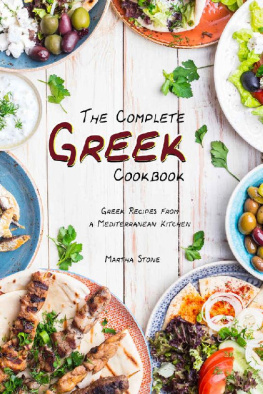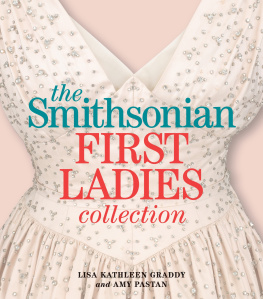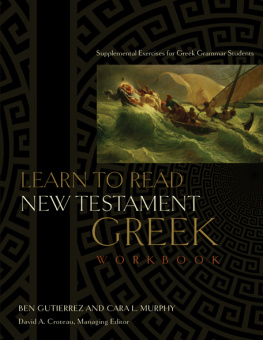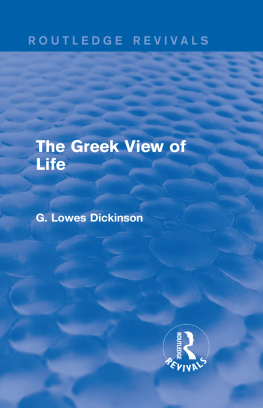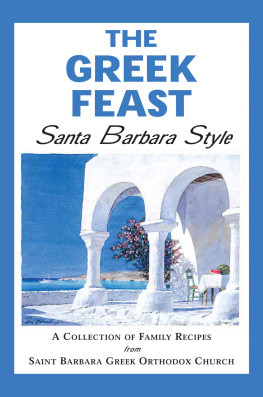Prins - Ladies Greek: Ladies` Greek
Here you can read online Prins - Ladies Greek: Ladies` Greek full text of the book (entire story) in english for free. Download pdf and epub, get meaning, cover and reviews about this ebook. City: Greece;Princeton, year: 2017, publisher: Princeton University Press, genre: Detective and thriller. Description of the work, (preface) as well as reviews are available. Best literature library LitArk.com created for fans of good reading and offers a wide selection of genres:
Romance novel
Science fiction
Adventure
Detective
Science
History
Home and family
Prose
Art
Politics
Computer
Non-fiction
Religion
Business
Children
Humor
Choose a favorite category and find really read worthwhile books. Enjoy immersion in the world of imagination, feel the emotions of the characters or learn something new for yourself, make an fascinating discovery.
- Book:Ladies Greek: Ladies` Greek
- Author:
- Publisher:Princeton University Press
- Genre:
- Year:2017
- City:Greece;Princeton
- Rating:5 / 5
- Favourites:Add to favourites
- Your mark:
- 100
- 1
- 2
- 3
- 4
- 5
Ladies Greek: Ladies` Greek: summary, description and annotation
We offer to read an annotation, description, summary or preface (depends on what the author of the book "Ladies Greek: Ladies` Greek" wrote himself). If you haven't found the necessary information about the book — write in the comments, we will try to find it.
Prins: author's other books
Who wrote Ladies Greek: Ladies` Greek? Find out the surname, the name of the author of the book and a list of all author's works by series.
Ladies Greek: Ladies` Greek — read online for free the complete book (whole text) full work
Below is the text of the book, divided by pages. System saving the place of the last page read, allows you to conveniently read the book "Ladies Greek: Ladies` Greek" online for free, without having to search again every time where you left off. Put a bookmark, and you can go to the page where you finished reading at any time.
Font size:
Interval:
Bookmark:


Ladies Greek

LADIES
GREEK

VICTORIAN
TRANSLATIONS
OF TRAGEDY

Yopie Prins
PRINCETON UNIVERSITY PRESS
PRINCETON AND OXFORD
Copyright 2017 by Princeton University Press
Published by Princeton University Press,
41 William Street, Princeton, New Jersey 08540
In the United Kingdom: Princeton University Press,
6 Oxford Street, Woodstock, Oxfordshire OX20 1TR
press.princeton.edu
Jacket art: Top: Andrea Eis, My pain (Sophocles, Antigone), 2012.
Bottom: marginalia by Meta Glass (detail) in Sophocles, Antigone (New York:
American Book Co., 1891), photograph courtesy of Andrea Eis, 2008.
All Rights Reserved
ISBN 978-0-691-14188-6
ISBN (pbk.) 978-0-691-14189-3
Library of Congress Control Number: 2016959621
British Library Cataloging-in-Publication Data is available
This book has been composed in Minion Pro
Printed on acid-free paper.
Printed in the United States of America
1 3 5 7 9 10 8 6 4 2

Dedicated to my

CONTENTS

INTRODUCTION :
WOMEN AND THE GREEK ALPHABET

CHAPTER ONE :
THE SPELL OF GREEK

CHAPTER TWO :
IN PROMETHEUS BOUND

CHAPTER THREE :
THE EDUCATION OF ELECTRA

CHAPTER FOUR :
HIPPOLYTUS IN LADIES GREEK
( WITH THE ACCENTS )

CHAPTER FIVE :
DANCING GREEK LETTERS


ILLUSTRATIONS
PREFACE
BETWEEN ALPHA AND OMEGA
The dear delight of learning for learnings sake a dead language for sheer love of the beauty of its words and the delicacy of its syntactical relations... was... in a few laggard minds still obscurely is, unwomanly. Why? Jane Ellen Harrison posed this rhetorical question in Alpha and Omega, published in 1915, toward the end of her years as a classical scholar at Cambridge University. In Ladies Greek, I turn the question around in order to ask how the delight of learning a dead language became a mark of womanly character. How might we read Harrisons Why? back into the nineteenth century, to learn more about the ways in which women learned to read the Greek alphabet, to discover all the letters between alpha and omega? Why did women in Victorian England and America desire to learn ancient Greek, and how did they turn it into a language of and for desire? What was the appeal of a dead language, written in a strange alphabet and no longer spoken?
Womens desire for Greek was part of a larger culture that believed in building literary character through linguistic discipline, and especially through learning classical languages. In the course of the nineteenth century, during the transition from informal to formal education for women, and the formation of womens colleges on both sides of the Atlantic, women were drawn to the cultural prestige of Greek studies as one way to justify their claim to higher education. They also cultivated ancient Greek to distinguish a new class of women writers: from the broad literary culture associated with nineteenth-century Women of Letters emerged the Woman of Greek Letters, a generic figure mediating between classical literature and its popular reception, between the professionalization of philology and the popularization of classics, between classical literacy and the common reader. Through their mediation of Greek letters, these Anglo-American women became an important medium for classical transmission in the nineteenth century, and well into the next century.
My book combines an historical interest in the entry of Victorian women into Greek studies with a literary interest in their translations of Greek tragedy. Of course, they were reading and translating other classical texts as well; the active role played by women in the wide circulation of classics (including Ladies Latin alongside Ladies Greek) is a topic that deserves further elaboration in books beyond my own. Womens contribution to nineteenth-century classical discourses has been a focus of ongoing research by scholars such as Mary Beard, Rowena Fowler, Edith Hall, Lorna Hardwick, Fiona Macintosh, and Jennifer Wallace, and has sparked interest among a new generation of critics, such as Isobel Hurst in Victorian Women Writers and the Classics (2006), Shanyn Fiske in Heretical Hellenism (2008), Stefano Evangelista in British Aestheticism and Ancient Greece (2009), Tracy Olverson in Women Writers and the Dark Side of Late-Victorian Hellenism (2010), Theodore Koulouris in Hellenism and Loss in the Work of Virginia Woolf (2011), in a special issue of Womens Studies edited by Noah Comet on Nineteenth-century Women Writers and the Classical Inheritance (2011), and in various contributions to The Oxford History of Classical Reception in English Literature, vol. 4 (2015). On the other side of the Atlantic, the world of American womens classicism has been opened up for further exploration by Caroline Winterer in The Mirror of Antiquity (2007), in essays edited by Gregory Staley for American Women and Classical Myths (2008), by Helene Foley in Reimagining Greek Tragedy on the U.S. Stage (2012), and in various contributions to The Oxford Handbook of Greek Drama in the Americas (2015). Uncovering a multiplicity of materials in order to recover the history of women in classics, this research has called into question a common assumption among classical scholars and cultural historiansincluding an earlier generation of feminist literary criticsthat women were excluded from a masculine tradition of classical learning in the nineteenth century. Beyond a broad survey of multiple women or a more narrow focus on individual women within this history, we can now begin to read in further detail exactly how these women engaged with ideas about classical antiquity, and how much they contributed to the idealization of all things Greek.
When I started delving into the archives of womens colleges and literary papers stowed away in libraries and other special collections, my purpose was to find the traces of women writers who learned to read and translate ancient Greek in nineteenth-century England and America. In this respect, and in retrospect, my book is a recovery project with a longer genealogy in feminist literary history. Back in 1984, Sandra Gilbert and Susan Gubar published an essay in
Next pageFont size:
Interval:
Bookmark:
Similar books «Ladies Greek: Ladies` Greek»
Look at similar books to Ladies Greek: Ladies` Greek. We have selected literature similar in name and meaning in the hope of providing readers with more options to find new, interesting, not yet read works.
Discussion, reviews of the book Ladies Greek: Ladies` Greek and just readers' own opinions. Leave your comments, write what you think about the work, its meaning or the main characters. Specify what exactly you liked and what you didn't like, and why you think so.

